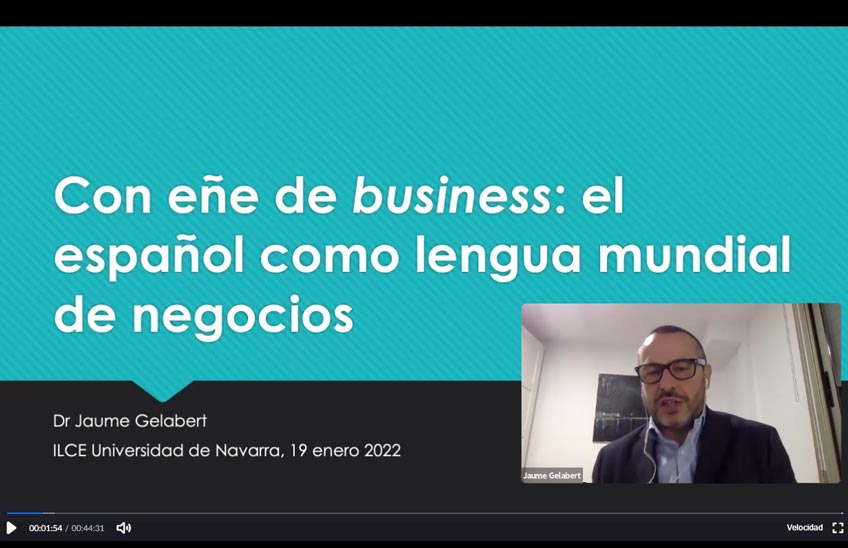News
Learning the cultural aspects of a society, the key to teaching Spanish with specific purposes
Jaume Gelabert, professor of Spanish and linguistics in the United States, hosts a session about the business of Spanish and with specific purposes

PhotoScreen capture/Jaume Gelabert during the session
02 | 02 | 2022
Jaume Gelabert, professor of Spanish and linguistics at Loyola University Chicago (2004-09) and director of programs for Spain and Cuba at Arcadia University (2009-21), hosted a session about the Spanish for business with specific purposes, in the framework of the Master’s Program in Spanish Second Language Teaching. With the title “With Ñ of business: Spanish as a global language of business”, in his speech he offered a general view about the situation of Spanish in the world and explained how the language of business and international culture has changed.
As he explained, the final data of the Cervantes Institute indicates that in 2021, more than 493 million people speak Spanish as their mother tongue. This number may be 591 million (only Mandarin Chinese and English are more popular) if they have in mind the other potential users of Spanish in the world—native speakers with limited proficiency, and Spanish language students. On the other hand, as indicated by the Cervantes Institute, Spanish speakers from areas where Spanish is not the official language, but are connected to an area that is, have greater business opportunities, more economic and cultural exchange, and an influx of qualified professionals.
In this context, the offer of Spanish for Specific Purposes (EFE) Programs in american universities has increased within the past few years, like the speaker noted in his speech: “The mode of teaching our language in this country, which in 2060 will be the second largest Spanish speaking country behind Mexico, will also have changed the language drastically. Since the beginning, this teaching strategy has been done in a residual way, but now it is taught with a more reasonable philosophy: after the free trade agreement between Canada, the United States, and Mexico, the teaching of Spanish for purposes like business, tourism, or medicine; areas in which a lot of business has been seen”. Against these, he stated that as a sociolinguist, “It has always caught my eye to not see the United States on a map of Spanish speaking countries, even though more than 60 million speak Spanish currently”. “Although psychologically Americans and foreigners do not see the United States as a Spanish speaking country, it is one in its own right”, he added.
On the other hand, the expert has underlined the necessity of reinforcing the cultural competencies of students learning languages with specific purposes or about business. “We cannot separate language from culture. When teaching a language, it is vital to teach the cultural aspects of a society. Colombia, Peru, or the Caribbean areas are Spanish-speaking countries, but they are all extremely different”. For this reason, he encouraged them to consider the following parameters: communication, evaluation, persuasion, leadership, decision, trust, disagreement and agenda. “Acquiring the lexicon to teach business is very easy; the complicated but fascinating, entertaining, and exciting part is considering the cultural codes that characterize the goals of your students, because culture cannot be separated from language”.
Jaume Gelabert has a degree in Spanish Philology from the University of the Balearic Islands (1995), a Master’s Degree in Spanish Linguistics from The University of Mexico, USA (2000) and a Ph.D. in Spanish Linguistics (Sociolinguistics) from Pennsylvania State University, USA (2004). He has been a Spanish and linguistics professor at Loyola University Chicago (2004-09) and director of programs for Spain and Cuba at Arcadia University (2009-21). He has published on metaphors, pronouns in political language, and foreign language teaching methodology.
Information
ilce@unav.esIsmael Sánchez Bella Building
31009 Pamplona, Spain
+34 948 425 600 | Ext: 802361
